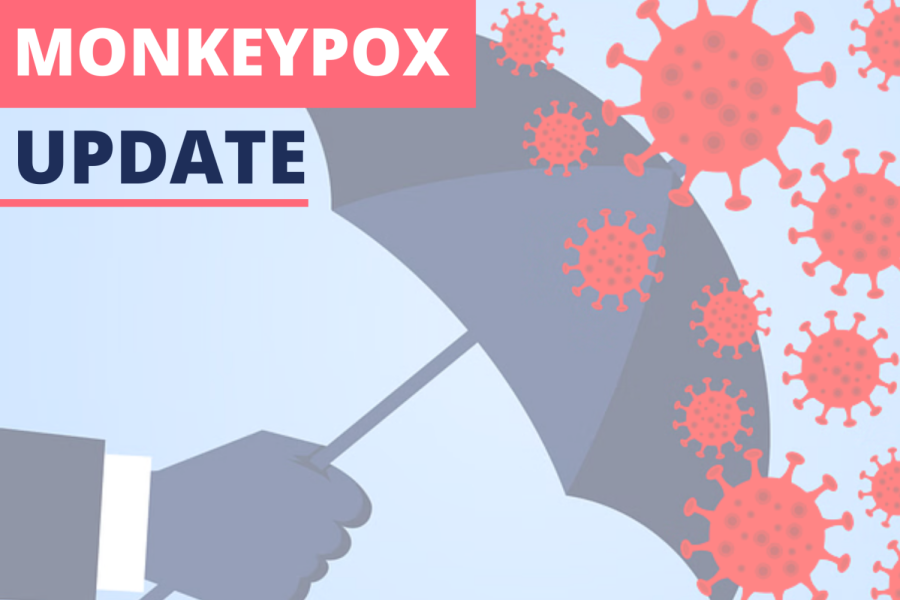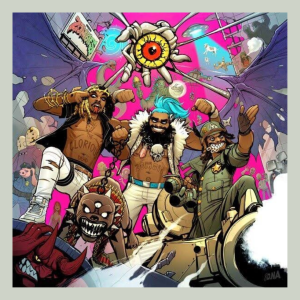Monkeypox: the whispered pandemic
September 22, 2022
An outbreak of monkeypox occurred in May of this year. This virus was first found in a colony of monkeys in 1958 in Copenhagen and is consistently regionally present in African countries.
The majority of cases have been reported in African countries and were rarely found in the Americas and Europe. With the rise of roughly 21 thousand cases in the U.S., more people are becoming aware of the disease and have reacted in different ways.
According to the CDC, “Infections with the type of monkeypox virus identified in this outbreak—the Clade IIb —are rarely fatal. Over 99% of people who get this form of the disease are likely to survive.”
The virus is spread through skin-to-skin contact, sharing of bodily fluids and touching the infected persons’ belongings. It can take up to two to four weeks to recover from monkeypox but it may take longer if the person has underlying health conditions.
While it has been known to travel by sharing bodily fluids, the general public has found that this needs to be resolved and is a health emergency.
According to the WHO, “Most cases so far have been identified through sexual health or other health services in primary or secondary health-care facilities and have involved mainly, but not exclusively, men who have sex with men.”
There has been a stigma around monkeypox leading people to believe it is a LGBTQ+ disease that Andy Seale from the WHO issued a statement that said that it is not a gay disease. This is due to the virus predominatly spreading among gay and bisexual men
“As a bisexual person with many LGBTQ+ friends it definitely affects me in that it kind of hangs over all our heads while we try to figure out how we feel about it,” said Katie Daniels, a sophomore psychology major. “The narrative that this is a sexually transmitted virus does scare me. I think any situation like this seems to give hateful people another excuse to be homophobic and people love an excuse to be hateful.”
A member of the Pride Alliance at GC shares similar sentiments about the virus and vaccine.
“I personally feel like having the vaccine pushed towards us is a little discomforting as it gives a lot of people the wrong idea about how the virus is spread,” said Natalie Mears, a sophomore biology major. “It is not an STI for queer people and I think that the marketing of it makes many people feel like it is. I have already seen people talking down on queer people in relation to monkeypox so it just makes me feel uncomfortable to see so many people engaging with it this way.”
Because students’ lives have been continuously affected by COVID-19 in the past two years, there is indifference to monkeypox among the students of GC.
“Monkeypox hasn’t affected my life at all and I have not taken any steps to protect myself,” said Wyatt Jordan, a sophomore accounting major. “I have heard of the vaccine and it could work but I am not getting the vaccine because I am not too worried about it.”
Monkeypox has not been as discussed in-depth as COVID-19 has led to not much information being widely spread about it.
“I kind of know what monkeypox is and it makes me double think about wanting to go outside or any outdoor place with other people,” said Andrea Matul, a sophomore criminal justice major. “The only step I have taken is being more careful when going out. I haven’t heard of the vaccine but I am not sure if it will work”
Charlotte Aexel, a sophomore English major, has similar feelings regarding monkeypox and the vaccine.
“I do know what monkeypox is and it hasn’t really affected my life,” said Aexel. “I haven’t really taken anything other than general hygiene precautions to protect myself. I have heard of the vaccine and think that it might work. I’m not getting it now but if the situation gets worse then I will consider it.”
Some students do not feel comfortable taking the vaccine because of the minimal amount of information given about it.
“I know what monkeypox is and it hasn’t affected me,” said Leah Kelly, a sophomore business major. “I have done nothing to protect myself. No, I will not be getting the vaccine because I have very little information about the vaccine and I am not educated enough to make the best decision as of now.“
Others have continued to take precautions because of how COVID-19 has impacted their lives.
“I’d say it’s made me a little scared and more cautious given how massive the pandemic was,” said Tori Johnson, a junior marketing major. “I try not to touch things other people have touched and disinfect new purchases. I have heard about the vaccine but I don’t know much about it. I think it is going to work and am more than likely to get the vaccine. Vaccines haven’t done me wrong so far.”




